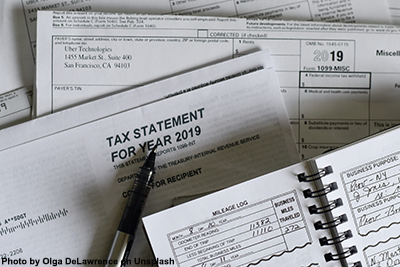
Is Prescriptive Period For Tax Refund Claims Extendible?
By: Atty. Rodel C. Unciano
"In sum, the regulations extended the two-year prescriptive period for filing refund claims as defined in the laws. Can this be done, considering the strict nature of the 2-year prescriptive period?"
Our tax laws provide instances where taxpayers are granted the right to apply for the refund of taxes. Among these are the unused input taxes related to zero-rated sales and erroneously of illegally paid taxes or penalties. As regards the refunds of unutilized input taxes incurred by taxpayers whose sales are zero-rated or effectively zero-rated, an application for refund has to be made within two (2) years after the close of the taxable quarter when the sales were made.
 Aside from these usual refundable unutilized input taxes related to zero-rated sales, erroneously or illegally collected taxes may also be the subject of a refund. This includes excess or unutilized creditable withholding taxes. Application for refund for erroneously or illegally collected taxes or penalties should also be made within two (2) years from the date of payment of such tax or penalty. This 2-year period applies to both the filing of the claim with the tax bureau and with the Court of Tax Appeals. The strict provision of the laws do not allow extensions, notwithstanding any supervening cause that may arise after the payment.
Aside from these usual refundable unutilized input taxes related to zero-rated sales, erroneously or illegally collected taxes may also be the subject of a refund. This includes excess or unutilized creditable withholding taxes. Application for refund for erroneously or illegally collected taxes or penalties should also be made within two (2) years from the date of payment of such tax or penalty. This 2-year period applies to both the filing of the claim with the tax bureau and with the Court of Tax Appeals. The strict provision of the laws do not allow extensions, notwithstanding any supervening cause that may arise after the payment.
Note though that as a temporary emergency measure in response to the Covid-19 pandemic, the Department of Finance issued Revenue Regulations Nos. 7-2020, 10-2020 and 11-2020, authorizing the extension of the two-year prescriptive periods for filing claims for refund with the tax bureau. Following these regulations, erroneous payments made from March 17, 2018 to April 30, 2018 may now be filed until June 14, 2020, while erroneous payments made from May 1, 2018 to May 31, 2018 may now be filed until June 30, 2020. For the VAT refund claims covering the calendar quarters ending March 31, 2018, April 30, 2018 and May 31, 2018, the applications for the refund claims have been extended to May 30, 2020, June 14, 2020 and June 30, 2020 respectively, or thirty (30) days from the lifting of the quarantine, whichever comes later.
In sum, the regulations extended the two-year prescriptive period for filing refund claims as defined in the laws. Can this be done, considering the strict nature of the 2-year prescriptive period?
True, Section 4(Z) of Republic Act 11469 or the “Bayanihan to Heal As One Act”, upon which the regulations are anchored, authorizes the President to move statutory deadlines and timelines for the filing and submission of any document, the payment of taxes, fees and other charges required by law. However, the authority granted by law seems to exclude the power to extend the two-year statutory deadline for filing refund claims. The two-year prescriptive periods are clearly granted under the Tax Code, thus, extension of the deadlines requires amendment of the Tax Code, or at the very least, the law authorizing the President to do so must clearly say so.
statutory deadlines and timelines for the filing and submission of any document, the payment of taxes, fees and other charges required by law. However, the authority granted by law seems to exclude the power to extend the two-year statutory deadline for filing refund claims. The two-year prescriptive periods are clearly granted under the Tax Code, thus, extension of the deadlines requires amendment of the Tax Code, or at the very least, the law authorizing the President to do so must clearly say so.
As the regulations seem to stand on a weak foundation, compliance therewith might give birth to a number of issues if the claims are not favorably acted upon by the Commissioner. Issue of late filing may potentially be questioned later in court. For VAT refund claims, while it is now settled that the judicial claim need not be filed within the two-year prescriptive period, and an appeal to the Tax Court may only be had after thirty days from an action or inaction is made on the refund claim, still the delayed filing of the administrative claim with the Commissioner might crop up as issue once the claim is elevated to the Tax Court. The concern with respect to erroneously or illegally collected taxes or penalties is more pronounced. The extension of the 2-year period within which an administrative claim may be filed would mean that it is possible for such claim to be filed beyond the 2-year period. Meantime, as there is no extension of the 2-year period for the filing of an appeal with the Tax Court, filing of such appeal after the filing of the administrative claim may result in the filing of the judicial claim beyond the 2-year period. Prudent dictates that, despite the extension of the period for filing the claim with the tax bureau, the same should still be filed within the 2-year period so that the judicial claim could also be filed within the same period.
There is no question that the regulations intend to give relief to taxpayers. However, the same must be anchored on a solid ground to avoid any controversy that may arise on its compliance. Otherwise, the relief it seeks to provide may contain the seed of another controversy which a taxpayer may have to face later on.
The author is a partner of Du-Baladad and Associates Law Offices (BDB Law), a member-firm of WTS Global.
The article is for general information only and is not intended, nor should be construed as a substitute for tax, legal or financial advice on any specific matter. Applicability of this article to any actual or particular tax or legal issue should be supported therefore by a professional study or advice. If you have any comments or questions concerning the article, you may e-mail the author at This email address is being protected from spambots. You need JavaScript enabled to view it. or call 8403-2001 local 140.




